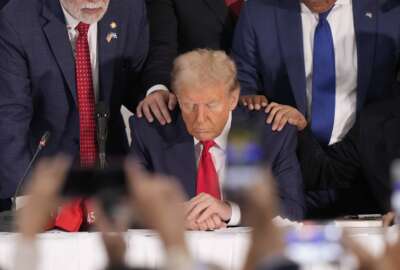Will your agency be dogged by DOGE?
The DOGE gambit will run into a basic fact: Every department, agency, program, grant and contract has a constituency, including Congress, to fight for it.
How do you even say “DOGE?” Is the G like in dog, or in rouge? Maybe “doggie?” Whatever, the sardonically-named “Department of Government Efficiency” may sound like something dreamed up by cartoonist Al Capp or Mad Magazine Editor Al Feldstein. But it likely will possess real teeth to go with the bark.
What will it bite into, exactly? Whether you think the goals of DOGE are long overdue, or that they’d wreck the republic, realize the effort faces a practical reality. So the day after inauguration, do this: Get up, make your bed and go to work. Your job is unlikely to disappear quite so fast.
The media have been transfixed with DOGE stories. A story it is, too. Vivek Ramaswamy and Elon Musk (V&E) want to reduce federal spending by $2 trillion. They have the Education Department, IRS and FBI in their sights for elimination, among others. Other stories have DOGE going after regulation, the reduction of which they believe would expand economic growth, which is what pays for expanding government.
DOGE also gets a lot of attention simply because of the large personalities behind it.
“Rescind those regulations, pull those regs back, and then that gives us the industrial logic to then downsize the size of that administrative state,” Ramaswamy said in one interview. “And the beauty of all of this is, that can be achieved just through executive action without Congress.”
V&E don’t say whether the $2 trillion in cuts would come in fiscal 2025 or over some number of years. They’ve been quoted as wanting to reduce the federal workforce by 50% the first year. But closing the entirety of the departments and agencies won’t get them to $2 trillion. The discretionary budget for all those entities is less than $1.5 trillion.
The DOGE gambit grows from a thicket of philosophical questions. Tactically, it makes gigantic promises with, I presume, the hope of making measurable gains. In the same sense, the Affordable Care Act was the reality emerging from the desire of some members of Congress and the Obama administration to do away with private insurance and have the government insure everyone.
As for practicalities, V&E need look no further than reports that elements of the government produce regularly to reduce waste and promote efficiency. Among my favorites: the Government Accountability Office’s annual fragmentation, overlap and duplication report. While there, they could check out the GAO’s improper payments report. Between duplication and bad accounting, you can find hundreds of billions of dollars in savings.
After that, V&E could comb the hundreds of inspectors general reports that regularly identify waste.
But we know their goal isn’t traditional good-government, or having agency managers pay more attention to the GAO. Rather, DOGE aims for something far more disruptive.
The DOGE team will face, though, a basic fact: Namely, that every department, agency, component, grant or acquisition program has a constituency that will fight to maintain it. Each piece also has patrons in Congress, which has a variety of statutes it can invoke to maintain federal operations.
You can neither dismiss DOGE outright nor expect it to steamroll across the government. Brace for some real dogfights.
Copyright © 2024 Federal News Network. All rights reserved. This website is not intended for users located within the European Economic Area.
Tom Temin is host of the Federal Drive and has been providing insight on federal technology and management issues for more than 30 years.
Follow @tteminWFED







